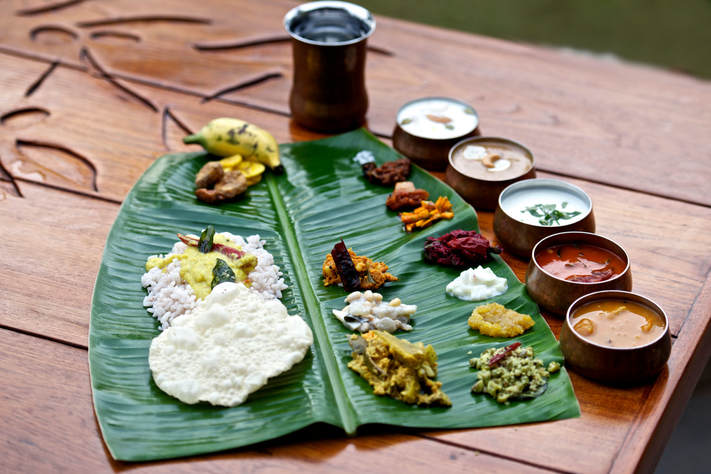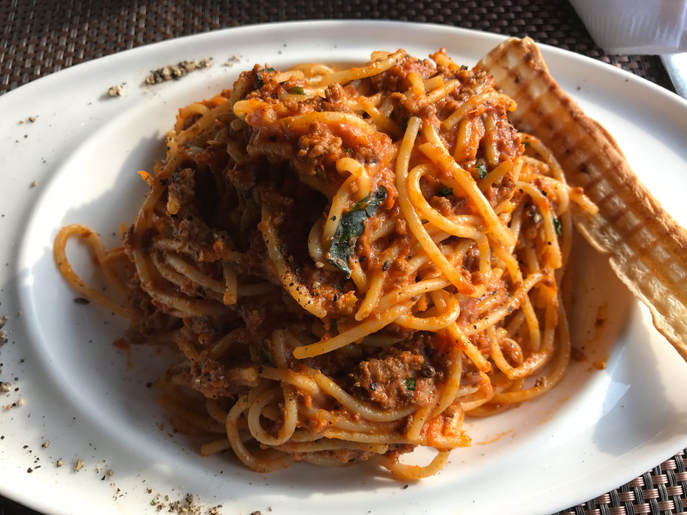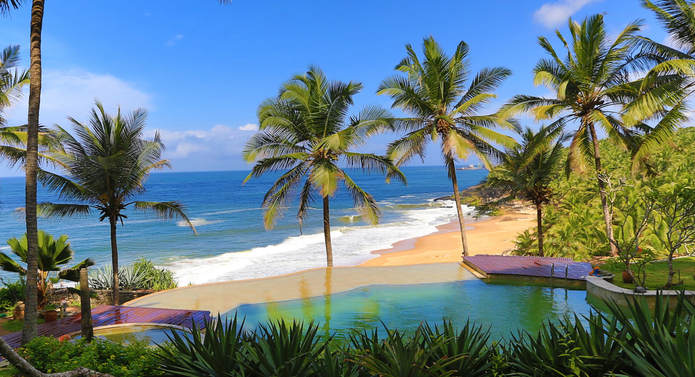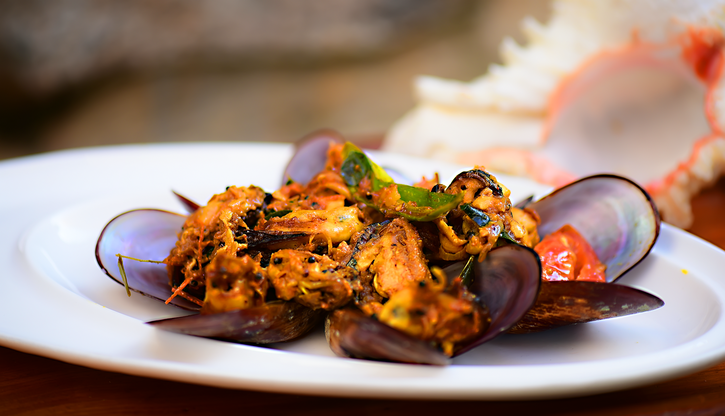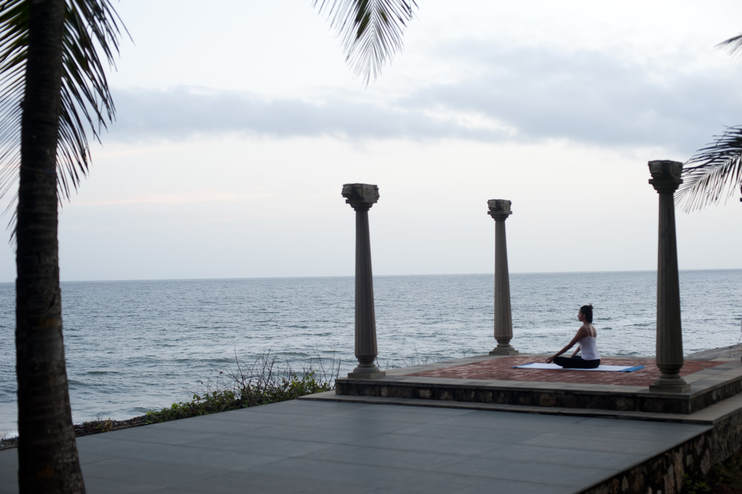Does Ayurveda require vegetarianism?
Does Ayurveda require vegetarianism? Do I have to become a vegetarian in order to benefit from Ayurvedic treatment? Are there Ayurveda resorts with non-vegetarian food? In this blog, we will explore these questions and learn about the diversity of health resorts in India, especially as concerns food and vegetarianism.
Men are from Mars. Women are from Venus. Even in the world of Ayurveda!
Any honest Ayurvedic doctor will tell you that men and women respond differently to Ayurvedic treatment – physically, emotionally, and attitudinally. Much of this has to do with food and yoga. For instance, if you're someone who doesn’t like yoga, you may be resistant to trying it; and if you're someone who prefers the gym, you may be upset when you get to a health resort and find out that there is no gym!
Similarly, if you don’t like vegetarian food or you don't have it on a regular basis, you may experience enormous difficultly surviving a week or two at a pure vegetarian health resort. These kinds of problems and resistances are not uncommon. They occur all the time with inexperienced health tourists and unassuming leisure travellers, but fortunately the health and wellness landscape in India has evolved to accommodate different needs and expectations. Knowing where to go is half the battle. And having the right travel advisor is the name of the game.
I once had a friend who said to me, “Aly, I don’t want any doctor telling me what to eat. So don’t send me to any place that is strict. As for my wife, she will accept the vegetarian diet. And she likes yoga and is very advanced. I might try the yoga but I don’t want to be forced. I prefer the gym.”
I can deeply empathize with the above sentiments. I was my friend, once upon a time. Before March 2014, there was not one day in my life without chicken, fish, beef or lamb as part of my diet. That all changed when I went to an Ayurvedic health resort called Indus Valley Ayurvedic Centre in Mysore.
My first pancharkarma, my first encounter with Ayurveda, forced me to adopt a pure vegetarian diet for 12 days without alcohol, without coffee, without sweets. It was frustrating; it was tiring; it felt monotonous; and I got headaches, which I never get! But after the pain came the bliss. Much to my amazement, I felt great after being completely detoxed. In fact, I felt so great that I came back a month later.
Having said the above, panchakarma (detoxification) is not for the faint of heart. And I can understand why people would hesitate going to a health resort if there is no meat or chicken or seafood. I have repeatedly seen how the fear of food prevents people from going to a health resort. So over the years, I have acquainted myself with the diverse food landscape at health resorts in India and so could advise people like my friend who disdain vegetarian food and doctors telling them what to eat.
Any honest Ayurvedic doctor will tell you that men and women respond differently to Ayurvedic treatment – physically, emotionally, and attitudinally. Much of this has to do with food and yoga. For instance, if you're someone who doesn’t like yoga, you may be resistant to trying it; and if you're someone who prefers the gym, you may be upset when you get to a health resort and find out that there is no gym!
Similarly, if you don’t like vegetarian food or you don't have it on a regular basis, you may experience enormous difficultly surviving a week or two at a pure vegetarian health resort. These kinds of problems and resistances are not uncommon. They occur all the time with inexperienced health tourists and unassuming leisure travellers, but fortunately the health and wellness landscape in India has evolved to accommodate different needs and expectations. Knowing where to go is half the battle. And having the right travel advisor is the name of the game.
I once had a friend who said to me, “Aly, I don’t want any doctor telling me what to eat. So don’t send me to any place that is strict. As for my wife, she will accept the vegetarian diet. And she likes yoga and is very advanced. I might try the yoga but I don’t want to be forced. I prefer the gym.”
I can deeply empathize with the above sentiments. I was my friend, once upon a time. Before March 2014, there was not one day in my life without chicken, fish, beef or lamb as part of my diet. That all changed when I went to an Ayurvedic health resort called Indus Valley Ayurvedic Centre in Mysore.
My first pancharkarma, my first encounter with Ayurveda, forced me to adopt a pure vegetarian diet for 12 days without alcohol, without coffee, without sweets. It was frustrating; it was tiring; it felt monotonous; and I got headaches, which I never get! But after the pain came the bliss. Much to my amazement, I felt great after being completely detoxed. In fact, I felt so great that I came back a month later.
Having said the above, panchakarma (detoxification) is not for the faint of heart. And I can understand why people would hesitate going to a health resort if there is no meat or chicken or seafood. I have repeatedly seen how the fear of food prevents people from going to a health resort. So over the years, I have acquainted myself with the diverse food landscape at health resorts in India and so could advise people like my friend who disdain vegetarian food and doctors telling them what to eat.
Pictured above is the “wellness thali” at Niraamaya Retreats
But let me also clarify one refreshing and rather surprising finding in my wellness journey: I have never met an Ayurvedic doctor who told me to become a vegan or vegetarian. Quite the contrary, nearly all Ayurvedic doctors that I have consulted have said: “No, don’t become a vegetarian at this point in your life. Continue having non-veg food but reduce if you can. Try to eat each type of meat (fish, chicken, lamb) not more than once or twice a week.” They reasoned that since I was raised on a non-vegetarian diet, I should not abruptly stop eating meat but moderate my intake and offset it with leaner, cleaner and fresher food. The message has always been conveyed without dogmatism, and so it found a way to the heart.
Here is the general dietary advice that I have collected from Ayurvedic doctors over the years:
Over the past five years, I have internalized the above but implemented it slowly. It's tough. It requires discipline. But it has been noticeably helpful. I feel better, stronger, healthier, more energetic. And I don't feel that I am sacrificing a whole lot.
Compared to my former self, I eat less meat and more vegetables, and even do “pure veg days”. But I also enjoy life: beer, wine, pizza, red meat, eggs, cheese, ice cream, chocolate, oil and butter. Nothing is really off limits. Indeed, I indulge from time to time, and feel no guilt about it. But then I also clean my body through an Ayurvedic detox every six months without fail. That’s what keeps my back and health in check.
So to be clear: Ayurveda does not impose vegetarianism and you don’t have to become a vegetarian in order to enjoy and experience Ayurvedic treatment.
Having said the above, it is true that the vast majority of health resorts in India offer vegetarian only. And if you are serious about your health, you will need to abstain from non-vegetarian food during panchakarma, the intensive Ayurvedic system of detoxifying the body. This usually lasts from 14 to 21 days, or longer in some cases.
Here is the general dietary advice that I have collected from Ayurvedic doctors over the years:
- Reduce consumption of non-vegetarian food
- Increase consumption of vegetarian food
- Limit raw foods, particularly in the evening
- Consume cooked food, freshly prepared
- Avoid refrigerated foods
- Eat your meals at fixed times
Over the past five years, I have internalized the above but implemented it slowly. It's tough. It requires discipline. But it has been noticeably helpful. I feel better, stronger, healthier, more energetic. And I don't feel that I am sacrificing a whole lot.
Compared to my former self, I eat less meat and more vegetables, and even do “pure veg days”. But I also enjoy life: beer, wine, pizza, red meat, eggs, cheese, ice cream, chocolate, oil and butter. Nothing is really off limits. Indeed, I indulge from time to time, and feel no guilt about it. But then I also clean my body through an Ayurvedic detox every six months without fail. That’s what keeps my back and health in check.
So to be clear: Ayurveda does not impose vegetarianism and you don’t have to become a vegetarian in order to enjoy and experience Ayurvedic treatment.
Having said the above, it is true that the vast majority of health resorts in India offer vegetarian only. And if you are serious about your health, you will need to abstain from non-vegetarian food during panchakarma, the intensive Ayurvedic system of detoxifying the body. This usually lasts from 14 to 21 days, or longer in some cases.
Pictured above is the amazing Spaghetti Bolognese at Niraamaya Retreats
Fortuitously also, Ayurveda does not recommend or encourage starvation diets in order to loose weight.
But there are limitations. Abstinence from normal food and living on a red rice soup for several days is usually required during a proper Ayurvedic detox called “panchakarma”. It’s tough but necessary. It scrubs your inner body and can transform your health.
A tale of two beaches
Coming back to my friend who did not want any doctor telling him what to eat, we managed to find just the right property for him: Niraamaya Retreats – a wellness resort where the Ayurvedic and non-Ayurvedic massages are excellent, the food options are plentiful, and the yoga is entirely optional. It is an oasis of tranquility on a cliff that overlooks the Arabian Sea and straddles two private beaches.
But there are limitations. Abstinence from normal food and living on a red rice soup for several days is usually required during a proper Ayurvedic detox called “panchakarma”. It’s tough but necessary. It scrubs your inner body and can transform your health.
A tale of two beaches
Coming back to my friend who did not want any doctor telling him what to eat, we managed to find just the right property for him: Niraamaya Retreats – a wellness resort where the Ayurvedic and non-Ayurvedic massages are excellent, the food options are plentiful, and the yoga is entirely optional. It is an oasis of tranquility on a cliff that overlooks the Arabian Sea and straddles two private beaches.
The iconic infinity pool at Niraayama Retreats overlooks the Arabia Sea
Food options
Unlike most Ayurveda destinations, Niraamaya boasts two outstanding restaurants with Ayurvedic and non-Ayurvedic food options. Not every guest at Niraamaya is there for health and wellness. Many of them are there for pleasure and leisure. The infinity pool. The beach. The spectacular weather. And the truly unique environment.
So if you want to experience Ayurveda but have concerns around food, then Niraamaya is the place to go because you have options and flexibility. You can try the vegetarian wellness diet and if it does not work for you, there are plentiful non-vegetarian items to choose from: chicken, beef, lamb, duck, pork and all varieties of seafood.
Unlike most Ayurveda destinations, Niraamaya boasts two outstanding restaurants with Ayurvedic and non-Ayurvedic food options. Not every guest at Niraamaya is there for health and wellness. Many of them are there for pleasure and leisure. The infinity pool. The beach. The spectacular weather. And the truly unique environment.
So if you want to experience Ayurveda but have concerns around food, then Niraamaya is the place to go because you have options and flexibility. You can try the vegetarian wellness diet and if it does not work for you, there are plentiful non-vegetarian items to choose from: chicken, beef, lamb, duck, pork and all varieties of seafood.
If you’re in the mood for seafood, try the mussels at Niraamaya Retreats
Wine and beer are also available at Niraamaya if you are not interested in detoxing or if you need a cheat day. All major types of cuisine can be found on its exotic menu: North Indian, South Indian, Chinese, Thai, Italian and Continental. Prakash, the Executive Chef at Niraamaya, has trained and worked all over the world.
Getting to Niraamaya
The nearest international airport is Trivandrum (TRV), which is roughly 40 minutes from Niraamaya Retreats by car. Shortly after your arrival at the resort, you can expect a detailed consultation and health checkup with the onsite Ayurvedic doctors, who are available for private and confidential discussions throughout your stay.
Exercise at Niraamaya
There are two venues for yoga: an outdoor platform by the sea or an indoor studio on hardwood floors. Classes are always small, usually less than five people. If yoga is not your thing, the resort has a fully equipped gym or you can walk on the beach.
Getting to Niraamaya
The nearest international airport is Trivandrum (TRV), which is roughly 40 minutes from Niraamaya Retreats by car. Shortly after your arrival at the resort, you can expect a detailed consultation and health checkup with the onsite Ayurvedic doctors, who are available for private and confidential discussions throughout your stay.
Exercise at Niraamaya
There are two venues for yoga: an outdoor platform by the sea or an indoor studio on hardwood floors. Classes are always small, usually less than five people. If yoga is not your thing, the resort has a fully equipped gym or you can walk on the beach.
The outdoor yoga platform at Niraamaya Retreats offers a place for quiet reflection
Transformation awaits you
In the end, my friend graciously declared, “You picked the perfect resort for us.” On their first visit to Niraamaya Retreats Surya Samudra, they stayed for 7 days. The following year, they stayed for 10 days. And whereas my friend earlier refused to let any doctor tell him what to eat, on his last visit he proudly declared, “I have not had any meat or seafood. I have managed to stay vegetarian this time.” That’s progress. That’s transformation.
In the end, my friend graciously declared, “You picked the perfect resort for us.” On their first visit to Niraamaya Retreats Surya Samudra, they stayed for 7 days. The following year, they stayed for 10 days. And whereas my friend earlier refused to let any doctor tell him what to eat, on his last visit he proudly declared, “I have not had any meat or seafood. I have managed to stay vegetarian this time.” That’s progress. That’s transformation.

